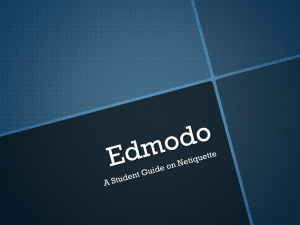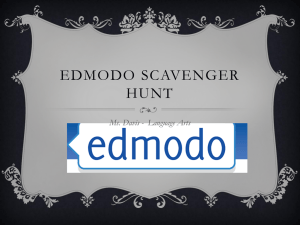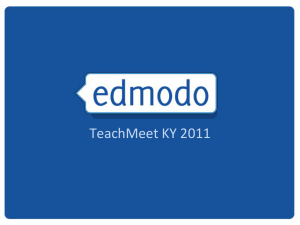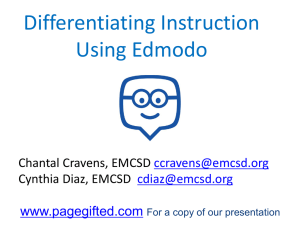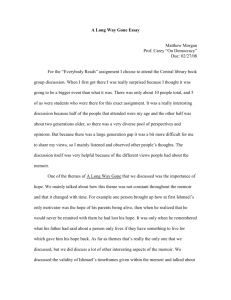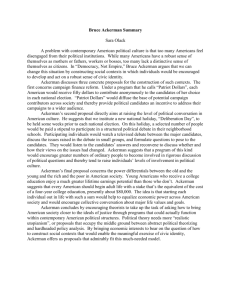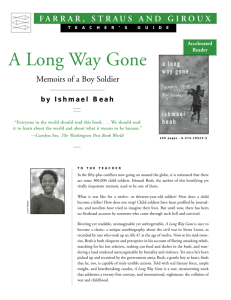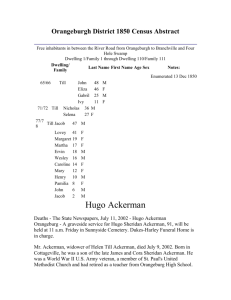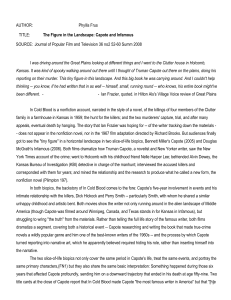Trinidad “Trini” Garza Early College
advertisement
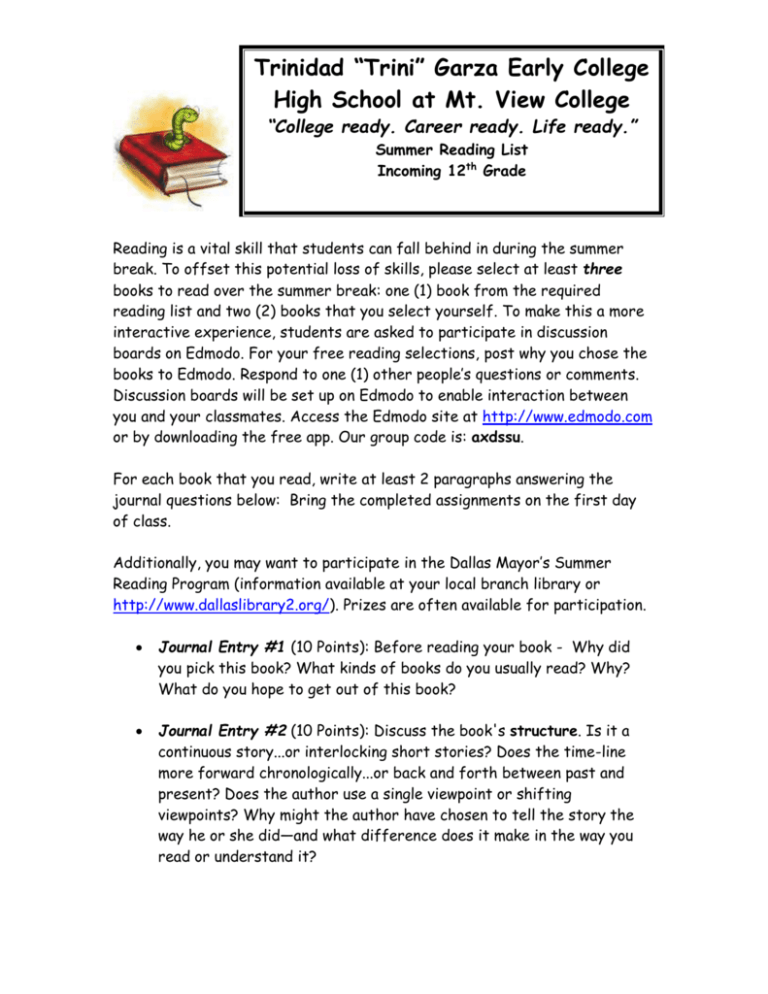
Trinidad “Trini” Garza Early College High School at Mt. View College “College ready. Career ready. Life ready.” Summer Reading List Incoming 12th Grade Reading is a vital skill that students can fall behind in during the summer break. To offset this potential loss of skills, please select at least three books to read over the summer break: one (1) book from the required reading list and two (2) books that you select yourself. To make this a more interactive experience, students are asked to participate in discussion boards on Edmodo. For your free reading selections, post why you chose the books to Edmodo. Respond to one (1) other people’s questions or comments. Discussion boards will be set up on Edmodo to enable interaction between you and your classmates. Access the Edmodo site at http://www.edmodo.com or by downloading the free app. Our group code is: axdssu. For each book that you read, write at least 2 paragraphs answering the journal questions below: Bring the completed assignments on the first day of class. Additionally, you may want to participate in the Dallas Mayor’s Summer Reading Program (information available at your local branch library or http://www.dallaslibrary2.org/). Prizes are often available for participation. Journal Entry #1 (10 Points): Before reading your book - Why did you pick this book? What kinds of books do you usually read? Why? What do you hope to get out of this book? Journal Entry #2 (10 Points): Discuss the book's structure. Is it a continuous story...or interlocking short stories? Does the time-line more forward chronologically...or back and forth between past and present? Does the author use a single viewpoint or shifting viewpoints? Why might the author have chosen to tell the story the way he or she did—and what difference does it make in the way you read or understand it? Journal Entry #3 (10 Points): What main ideas—themes—does the author explore? (Consider the title, often a clue to a theme.) Does the author use symbols to reinforce the main ideas? Journal Entry #4 (10 Points): Describe the main characters— personality traits, motivations, inner qualities. • Why do characters do what they do? • Are their actions justified? • Describe the dynamics between characters (in a marriage, family, or friendship). • How has the past shaped their lives? • Do you admire or disapprove of them? • Do they remind you of people you know? Journal Entry #5 (10 Points): After reading the book – discuss how you experienced the book? Were you engaged immediately, or did it take you a while to "get into it"? How did you feel reading it—amused, sad, disturbed, confused, bored...? Explain why. Required Reading Choose one of the books from the list below to read, carefully, over the summer: 1. Tortilla Curtain, T. C. Boyle 2. As I Lay Dying, William Faulkner 3. The Zookeeper’s Wife: A War Story, Diane Ackerman 4. In Cold Blood, Truman Capote 5. Long Day’s Journey into Night, Eugene O’Neill 6. The Passage, Justin Cronin 7. The Salt Eaters, Toni Cade Bambara 8. One Flew Over the Cuckoo’s Nest, Ken Kesey 9. A Long Way Gone: Memoirs of a Boy Soldier, Beah, Ishmael 10. Every Day, Levithan, David A description of each book is listed below to assist you in selecting your summer reading novel. Boyle, T.C.. Tortilla Curtain. Penguin Books, 1995. Topanga Canyon is home to two couples on a collision course. Los Angeles liberals Delaney and Kyra Mossbacher lead an ordered sushi-and-recycling existence in a newly gated hilltop community: he a sensitive nature writer, she an obsessive realtor. Mexican illegals Candido and America Rincon desperately cling to their vision of the American Dream as they fight off starvation in a makeshift camp deep in the ravine. And from the moment a freak accident brings Candido and Delaney into intimate contact, these four and their opposing worlds gradually intersect in what becomes a tragicomedy of error and misunderstanding. Faulkner, William.. As I Lay Dying. The book is narrated by 15 different characters over 59 chapters. It is the story of the death of Addie Bundren and her family's quest and motivations – noble or selfish – to honor her wish to be buried in the town of Jefferson. Ackerman, Diane. The Zookeeper’s Wife: A War Story. Norton, 2007. Ackerman works from the diary of Antonina Zabinski to present a dramatic true story based on a little-known chapter from Nazi Poland. Not only was Hitler interested in human genetics but also the purity of animal breeds. At the Warsaw Zoo, Antonina and her director husband struggle with wartime shortages, caring for the animals, their own family's needs, and the hundreds of Jews hidden at the zoo. Truman, Capote. In Cold Blood. The book examines the complex psychological relationship between two parolees who together commit a mass murder. Capote's book also explores the lives of the victims and the effect of the crime on the community where they lived. In Cold Blood is regarded by critics as a pioneering work of the true crime genre. Eugene O’Neill. Long Day’s Journey into the Night. One theme of the play is addiction and the resulting dysfunction of the family. All three males are alcoholics and Mary is addicted to morphine. In the play the characters conceal, blame, resent, regret, accuse and deny in an escalating cycle of conflict with occasional desperate and sincere attempts at affection, encouragement and consolation Cronin, Justin. The Passage. Ballantine Books, 2010. In a dystopian future, a virus found in a South American jungle was used to create a super soldier with great strength and healing abilities. The virus becomes an epidemic, and infected people become bloodthirsty monsters. Normal humans are hiding in fortresses trying to survive Bambara, Toni Cade. The Salt Eaters.The novel is set in a small, Southern town. Velma Henry, a long-time civil rights activist and feminist, sits in a hospital gown on a stool listening to the musical voice of Minnie Ransom. Old Minnie is a healer; she heals people by contacting the points of physical or psychical pain in her patients and relieving them. She is helped by her spirit guide, Old Wife. Scars heal and wounds close in minutes under her touch. Kesey, Ken. One Flew Over the Cuckoo’s Nest. The story, narrated by the gigantic but docile half-Native American inmate "Chief" Bromden, focuses on the antics of the rebellious Randle Patrick McMurphy, who faked insanity to serve out his prison sentence for statutory rape in the hospital. The head administrative nurse, Mildred Ratched, rules the ward with a mailed fist and with little medical oversight. She is assisted by her three black day-shift orderlies, and her assistant doctors. McMurphy constantly antagonizes Nurse Ratched and upsets the routines, leading to constant power struggles between the inmate and the nurse Beah, Ishmael. A Long Way Gone: Memoirs of a Boy Soldier. Farrar, Straus and Giroux, 2007. Twelve-year-old Ishmael first flees from attacking rebels with his friends, but later he is transformed into a cold-blooded soldier. This is a heartbreaking personal memoir of a boy growing up in Sierra Leone in the 1990s. Alex Award 2008 Levithan, David. Every Day. Alfred A. Knopf, 2012. Every morning, A wakes in a different person's body, in a different person's life, learning over the years to never get too attached. Life goes along smoothly until he wakes up in the body of Justin and falls in love with Justin's girlfriend, Rhiannon.
